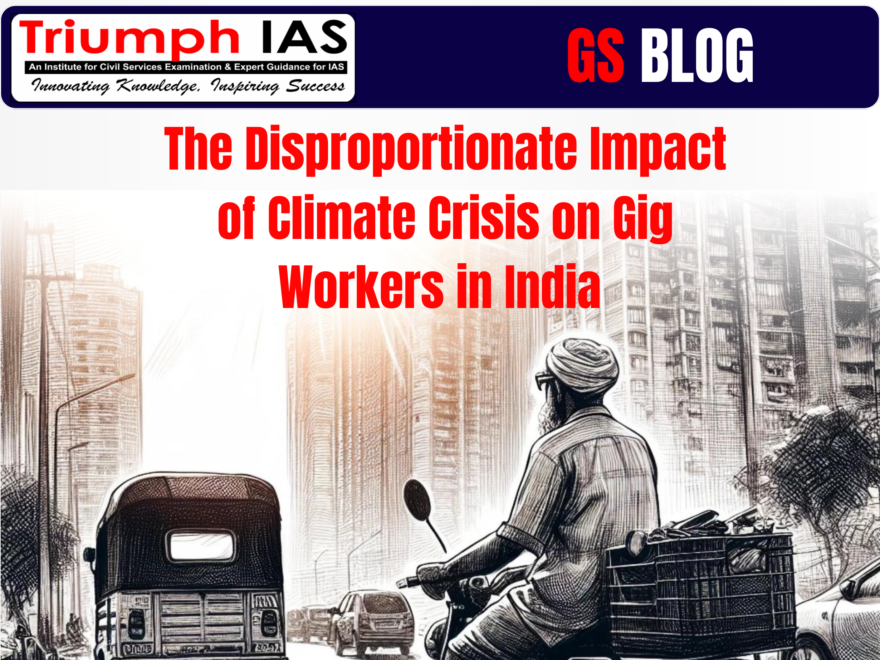The Disproportionate Impact of Climate Crisis on Gig Workers in India
The Harsh Reality of Delivery Workers in India
As the scorching summer heat engulfs Delhi, the lives of platform-based gig workers have become a stark example of how the climate crisis is disproportionately impacting the country’s most vulnerable populations.
Outside the inventory stores of quick commerce companies like Zomato-owned Blinkit, Swiggy Instamart, and Zepto, delivery workers wait in the unforgiving 45-degree heat to collect their orders. With single, worn-out water coolers as their only respite, they refill their bottles and wet their scarves before heading out to brave the blazing sun.
These delivery workers, who number around 400 daily at the Kishangarh compound, are forced to spend hours under the scorching sun both while waiting for orders and during deliveries, with little to no institutional support from their employers. Many workers, unable to afford taking time off, continue to work despite falling ill due to the heat.
The Toll on Health and Livelihoods
The Indian Express spoke to nearly 60 gig workers and found that over 30% of them had to take a break from work after falling sick due to the extreme heat. Martin, a Swiggy Instamart delivery worker, says he has had a “debilitating headache” at work every day for the past two months, which he attributes to the sun, but cannot afford to take a break.
The lack of empathy from supervisors further exacerbates the workers’ struggles. Rahul Singh, a Zomato delivery worker, recounts how he fell sick due to the severe heat and could not work for eight days, but his team leader never checked on him or inquired about his well-being.
The climate crisis not only harms the health of these gig workers but also their livelihoods. For vendors selling perishable goods like fresh produce, the heat causes rapid deterioration, leading to an average daily loss of ₹500-600. Additionally, 71.05% of vendors struggle to access medical care due to financial constraints, putting their lives at risk.
The Irony of Sustainability Goals
The plight of these gig workers highlights the irony of the sustainability goals set by their employers. Zomato, for instance, proudly claims that around a quarter of its 647 million deliveries last year were made by workers on bicycles, positioning this as part of its “climate conscious deliveries.”
However, the reality is that these workers, who are essential to Zomato’s sustainability efforts, are themselves at greater risk due to the climate crisis. Rahul, the Zomato delivery worker, questions the company’s claims, asking, “So, as I burn myself in the heat by delivering orders on my bicycle, I’m actually helping Zomato achieve its climate goals?”
Lack of Awareness and Support
The study by Greenpeace India and the National Hawkers Federation found that while 68% of street vendors in Delhi are aware of heatwaves, only 10% know about the city’s Heat Action Plan (HAP). Furthermore, 82% of vendors have not received any guidance on handling extreme heat.
To combat the heat, vendors resort to temporary measures like covering their heads with cloth and adding cooling foods to their diet, but these are not sustainable solutions. The report calls for the provision of primary healthcare, drinking water stations, common cooling centers, and government “loss and damage” funds to support these vulnerable workers.
How can companies better support gig workers during extreme heatwaves
Gig workers in India are facing significant challenges due to the extreme heat and heatwaves, which are disproportionately impacting their health, safety, and livelihoods. Companies employing these workers must take urgent action to better support them during these extreme weather events:
Provide Adequate Shade, Water, and Cooling Facilities: Companies should ensure that waiting areas and rest spaces for gig workers have adequate shade, access to drinking water, and cooling facilities like fans or air conditioning. This basic infrastructure can help workers cope with the heat and prevent heat-related illnesses.
Implement Heat Stress Protocols: Establish clear guidelines and protocols to protect workers from heat stress, including mandatory breaks, access to hydration, and procedures to identify and respond to heat-related symptoms. Regularly monitor workers’ health and provide necessary medical support.
Offer Flexible Work Arrangements: Allow gig workers to take breaks or adjust their schedules during the hottest parts of the day. Provide incentives or additional compensation to offset the increased risks and costs associated with working in extreme heat.
Improve Communication and Welfare Support: Ensure open communication channels where workers can report heat-related issues and receive timely assistance. Provide access to healthcare, insurance, and other social protection measures to support workers during times of illness or lost income due to heat-related disruptions.
Advocate for Regulatory Changes: Work with policymakers to develop and enforce labor standards and occupational safety regulations that specifically address the risks of extreme heat for outdoor and gig workers. This can include mandating heat stress prevention measures and providing compensation for heat-related illnesses.
By implementing these measures, companies can demonstrate their commitment to the well-being of their gig workforce and help build resilience against the growing threat of climate change-induced heatwaves. Prioritizing the health and safety of these vulnerable workers is not only the ethical thing to do but can also contribute to the long-term sustainability of the platform economy?
Conclusion
The plight of gig workers in Delhi’s scorching summer heat is a stark reminder of the disproportionate impact of the climate crisis on the country’s most vulnerable populations. As temperatures continue to rise, it is crucial that policymakers and companies address the needs of these workers, ensuring their health, safety, and livelihoods are protected. Only through a comprehensive and equitable approach can we truly build a resilient and sustainable future for all.
Sources: Indian Express
Sociology Optional Program for
UPSC CSE 2025 & 2026
Follow us :
🔎 https://www.instagram.com/triumphias


